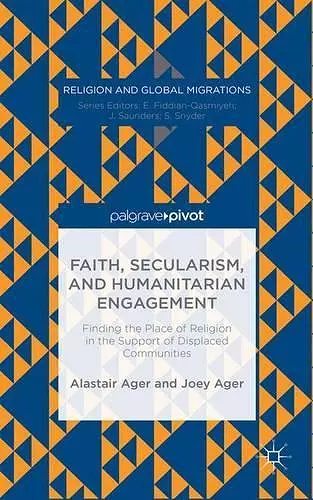Faith, Secularism, and Humanitarian Engagement: Finding the Place of Religion in the Support of Displaced Communities
Format:Hardback
Publisher:Palgrave Macmillan
Published:17th Sep '15
Currently unavailable, and unfortunately no date known when it will be back

"Must humanitarian organizations be secular? Yes, argue the authors of this insightful, timely, and powerfully argued book, but only if the secular is re-defined. It can no longer be seen as the ultimate epistemic standpoint, surveying from above the bewildering array of religious outlooks. We need a secularism which recognizes dilemmas and a global humanitarianism which recognizes that these dilemmas can only be resolved in partnership and exchange with the local. The authors explore this dialogical alternative in a penetrating and convincing style." - Charles Taylor, Professor Emeritus, McGill University, Canada, and author of A Secular Age "Ager and Ager provide a timely and necessary questioning of the secular frameworks which have come to be seen as the 'normal' form of organized humanitarian work. This book demands a re-view of religion's role in humanitarian engagement. This task is key to deconstructing the post-colonial understanding of both humanitarianism and developmentalism. The messages in this book are crucial to researchers, activists, and practitioners alike." Azza Karam, Senior Advisor, Culture, UNFPA and Coordinator, UN Inter-Agency Task Force on Religion and Development 'This readable book holds an important and helpful mirror to the humanitarian endeavour. It challenges those of us who claim to be humanitarians to 'recognise our own inherent values" and to desist from "un-self-critical presumptions of global humanitarianism.' This call to more engagement with adherents of faith on their terms may cause controversy in some quarters, but it is at the heart a call for humanitarians to get better at listening than at preaching.' - Nigel Timmins, Humanitarian Director, Oxfam International 'The humanitarian sector has long been held back in leveraging the benefits of integrating faith perspectives and resources through a misplaced and misapplied understanding of the need for neutrality and independence rooted in a modernist treatment of religion. There is often an irrational fear of proselytising in utilising or promoting any activity or language related to faith teaching. Ager and Ager have sensitively and insightfully unpacked this important phenomenon in a landmark work which will help the humanitarian community navigate its way to a post-secular age and a more professional, more humane service.' - Atallah FitzGibbon, Head of Policy and Advocacy, Islamic Relief Worldwide "This book focuses on a critical weakness in humanitarian discourse today. The traditional commitment to neutrality and impartiality in humanitarianism has failed to unearth and name the faith commitments implicit in the secular script that today's humanitarians accepts as normative. Insisting on ways to remove this privileging of the secular frame holds the promise of a more genuine neutrality and impartiality, while allowing the best of each tradition to benefit the global population of the forcibly displaced." - Bryant Myers, Professor of International Development, Fuller Theological Seminary, USA, and former Vice President for International Program Strategy with World Vision International
Strengthening local humanitarian engagement demands not only rethinking dominant understandings of religion, but also revisiting the principles and practices of humanitarianism. This book articulates key aspects of the 'transborder discourse' necessary for humanitarian dialogue in the 21st century.Strengthening local humanitarian engagement demands not only rethinking dominant understandings of religion, but also revisiting the principles and practices of humanitarianism. This book articulates key aspects of the 'transborder discourse' necessary for humanitarian dialogue in the 21st century.
“This book is a valuable text for students, researchers, practitioners, and policy makers engaged with and in humanitarianism, irrespective of their direct or indirect engagement with matters of faith or faith leaders and communities. This is particularly pertinent given the continuing, dominant, and core narrative of the secular necessities of humanitarianism and the very real implications this narrative has for both policy and practice.” (Khatereh Eghdamian, Journal of Refugee Studies, Vol. 29 (3), September, 2016)
ISBN: 9781137472137
Dimensions: unknown
Weight: 2716g
121 pages
1st ed. 2015